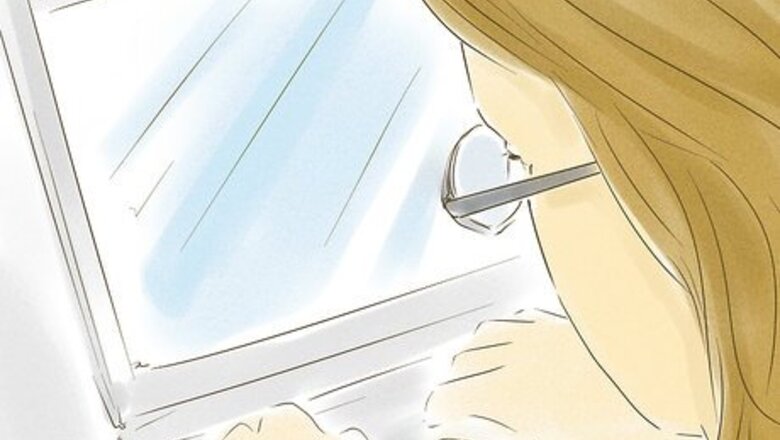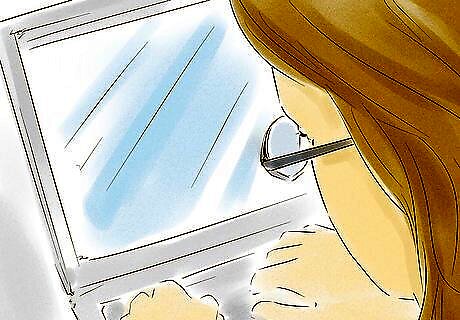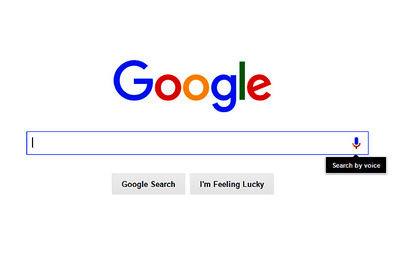
views
Building Empathy for Your Boyfriend

Learn about the condition. This is vital to developing empathy. Browse some websites that talk about ADD or ADHD. Get pamphlets from a local therapist's office. You can ask your boyfriend to refer you to reading materials, as he may know great places to read up on the conditions. People with ADD/ADHD may struggle to pay attention. Your boyfriend may zone out during conversations, for example, or struggle to sit still through a movie. People with ADD/ADHD may also be forgetful. If your boyfriend got the time wrong for a dinner date, he may have been listening to you earlier. He simply forgot the information. ADD and ADHD may cause poor organizational skills, so if you clean up after your boyfriend a lot, that's not necessarily because he's being rude. He just may struggle to keep up. People with ADD and ADHD may be more emotional and impulsive. Your boyfriend may suddenly blurt things out and may have a slight temper. It may be difficult to have a calm conversation with someone with ADD or ADHD.

Ask your boyfriend about his experiences. Talking with your boyfriend and asking him questions about his experiences with ADD or ADHD can also help you to gain valuable perspective. Some questions you might ask him to get a better sense of how ADD or ADHD affects him include: What is hardest about living with ADHD? Does it ever affect your emotions? Do you take medication? If so, how does the medication make you feel? Is there anything I can do to help?

Put yourself in your boyfriend's shoes when you feel frustrated. This is important to understanding your boyfriend's experience. When your boyfriend is frustrating you, pause for a second and consider his perspective. It is difficult to live with ADHD or ADD day in and day out. If your boyfriend is frustrating you, imagine how frustrated he must feel at himself. For example, you're angry because your boyfriend could not get out the door in time for a movie as he kept getting distracted along the way. While this is frustrating for you, think how your boyfriend must feel. He probably feels mad at himself for letting you down, and frustrated he's unable to manage his symptoms well enough for a simple movie date.

Keep the positives in mind. You were probably drawn to your boyfriend for a reason. He is not completely defined by his ADD/ADHD. Try to remember why you like being with him when things get frustrating. Try making a mental list of everything you like about your boyfriend. Does he always make you laugh? Is he more tolerant of your grouchiness after work? Does he do nice things for you, like bring you coffee in the morning? If you remember why you're in the relationship, this can quell any feelings of resentment you have. You will be able to feel more empathetic for someone if you remember why you value them.

Remember to communicate. Resentment can build up if you do not communicate regularly. Resentment can destroy empathy, so if something's bothering you, discuss it. Never make assumptions during a conversation. You do not understand why someone behaved the way they did without asking. Do not say, "You just don't care, which is why you never remember to take out the garbage. It's disrespectful." Instead, say, "Is there a reason you're having trouble remembering to take out the garbage?" When your boyfriend talks, listen actively. Do not interrupt. If you need clarification, wait until your boyfriend's done talking and say something like, "I'm not entirely sure what you mean. Could you explain more?" Also, remember to laugh. Miscommunications are inevitable, and facing them with good humor can help reduce tension.

Separate the symptoms from the person. If you're in a relationship with someone with ADD/ADHD, a lot of this person's actions can be read the wrong way. If your boyfriend interrupts you in mid-sentence, you may think he's not interested in what you have to say. If your boyfriend is 15 minutes late to a date, you may think he does not care about your time. These are symptoms of ADD/ADHD and do not necessarily speak to your boyfriend's character. It can take a long time for symptoms to be managed properly. There will be struggles along the way. In moments of frustration, say to yourself, "This is his ADHD. This is not him." Remember, you're with this person for a reason. If he's struggling to manage his ADHD/ADD at the moment, this is not a permanent situation. Once symptoms are more under control, you'll be able to focus more on his good qualities.
Managing Daily Tasks Together

Develop a routine or structure when necessary. If you have plans together, it can be very hard for someone with ADD/ADHD to stick to those plans. You can try putting a routine or structure in place to help your boyfriend manage. If the two of you are planning a trip together, make an extra effort to help your boyfriend keep himself on track. Try to split big tasks into smaller, more manageable chunks. You can have him pack his clothing one day, his toiletries the next, and so on. Encourage him to set reminders. As ADD/ADHD people are prone to forgetting, reminders can help. Set cell phone reminders on his calendar. On Monday, you can have a reminder that says, "Start Packing - Clothes." You can set a reminder for Friday that says, "Finish up Packing - Leaving Tomorrow."

Figure out a way to split up tasks. If you live with your boyfriend, household tasks can be difficult. You may feel resentment if you're constantly picking up after your boyfriend due to his lack of organizational skills. Try to assign tasks based on skills, and stick to a strict chore wheel. For example, your boyfriend is not good at dishes, as he rarely puts them away correctly. He has the same problem with laundry, as he often neglects to fold and store it. Maybe he could mop the kitchen floor after you put dishes away, or agree to place the clothes in the washer and dryer. Folding and storing can be your job. Your boyfriend may sometimes get distracted and fail to complete a chore. To deal with this, you can set aside a chunk of time each day where he can work on unfinished tasks, such as from 7pm to 8pm every evening. Having this rule in place ahead of time can prevent resentment over cleaning up after your boyfriend.

Make time to interact. Emotional intimacy is important to a relationship. It can be hard to manage things like date nights with someone with ADHD/ADD. Make the extra effort to do so, however, to make sure your relationship stays on track. You may have to have a more rigid schedule when your partner has ADD/ADHD. Last minute organization can be stressful. Therefore, you could set aside an established date night each week. Schedule other activities so that you spend time together. Make the most of your time together. Talk about important subjects. Share the details of your day. Have conversations with each other about things that are interesting to both of you. Get physically intimate with one another.

Decide together whether it'll help to set a shared bedtime. Someone with ADD/ADHD may have an erratic schedule. When your boyfriend stays over, it might help to agree on a rigid bedtime for both of you. You can cuddle, have sex, or read side-by-side. Spending some time together before bed can strengthen your bond. When you feel drowsy and want the lights off, your boyfriend can decide whether he wants to stay up later and leave the room or fall asleep with you. What's important is that you made sure you had that time together.
Supporting Your Boyfriend

Be understanding during conversations. Your boyfriend may have trouble understanding the flow of conversations. He may request reminders on occasion, saying things like, "Could you repeat that?" Try to be patient and understanding. If your boyfriend is having trouble following you, it does not mean he does not value you. Due to his ADHD, he may struggle to pay attention in conversation. The fact that he's asking you for clarification or to repeat things does not mean he's not listening. In fact, it means the opposite. Even while he's having trouble keeping up with the conversation, he's trying to make sure you feel heard.

Validate your boyfriend's needs. When your partner is expressing something, listen. Oftentimes, people may have an inclination to blame any disagreement on ADD/ADHD, but this is not the case. Doing so could make your boyfriend feel his feelings are not important. You do not have to agree with everything your partner says and does. You simply need to listen and understand. If your partner is feeling an emotion, don't say, "That's just your ADD." It may not be. Ask him to open up more about his emotion. Try something like, "Why do you think you're feeling that way?"

Avoid parenting your partner. One of the biggest challenges in a relationship with one ADHD partner is the tendency of the other partner to take charge. Because it can be hard for someone with ADHD to manage time and stay organized and focused, the non-ADHD person may feel it's easier to take charge. But this can lead to resentment and stress. Use “I” statements to communicate your feelings. Tell your partner how you're feeling in a way that takes responsibility for your own reactions. These types of statements do not blame your partner. For example, say, “I feel like I've got more on my plate than I can handle right now. Would you be able to take the car to the mechanic?” Stop nagging your boyfriend. Instead, focus on communicating positively and optimistically. Recognize that it takes time to develop strategies to manage ADHD, and that your boyfriend is working on it.

Encourage your boyfriend to get the right treatment. The process to getting treatment can be long and frustrating. You have to try many different types of drugs and make a variety of lifestyle changes before you find treatment that works. Support and encourage your boyfriend throughout his journey to better health. Adults with ADHD generally benefit from psychotherapy. This treatment helps individuals accept who they are, while at the same time helps them seek improvements to their situation. Cognitive behavioral therapy directly geared toward treating ADHD has been useful for many patients. This type of therapy addresses some of the core problems caused by ADHD, such as time management and organizational issues. Diet and exercise can also help treat ADHD. Eliminating simple sugars, limiting carbs, and taking a daily fish oil supplement can all help. While you can't take medication or make appointments for him, support his efforts to do so. If he needs help organizing his pills, or remembering when to meet with his doctor, leave him reminders. Have patience, and encourage him to have patience. It may take a while to find the right treatment, but the benefits will be worth the struggle.

Attend support groups together. There are many support groups for couples with mental illness. If your boyfriend has ADD or ADHD, check to see if there are any support groups offered at a local mental health center or hospital. If you can't find support groups in your area, try looking for support groups online.




















Comments
0 comment